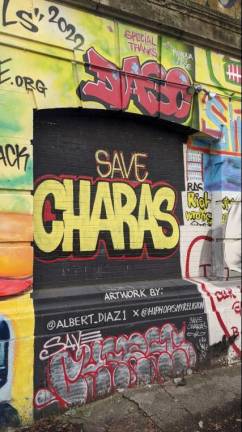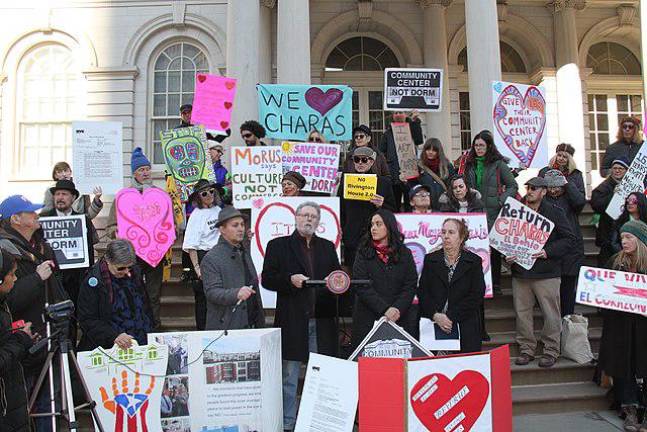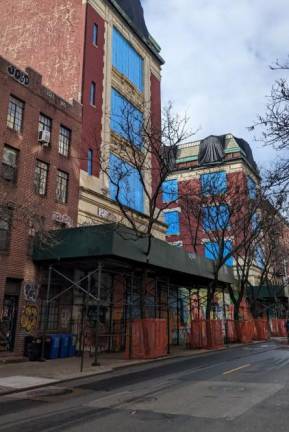What’s Next Now That Singer’s Out at Former Charas/El Bohio Center? And Who’s New Owner?
One of the most gripping real estate dramas in the East Villlage for decades has been the fight to reclaim the landmarked building–once a public school and then the Charas/El Bohio Community Center. Longtime owner Gregg Singer, who wanted to turn it a dorm, is out. But who is the new owner?



It’s the East Village real estate saga that seemed like it would never end: P.S. 64, later the beloved CHARAS / El Bohio community center and, for the last twenty-three years, nothing but a battle.
Today, while its fate remains uncertain, the protagonist / antagonist of the story, real estate developer Gregg Singer, is out. Having controversially purchased the property from New York City in 1999 for $3.15 million, Singer’s plans for the site, which is located just east of Avenue B from East 9th to East 10th streets, were repeatedly thwarted.
In March 2023, Singer sought bankruptcy protection from his lender, Madison Realty Capital. In November, prior to an expected auction, Madison sold the loan an entity named 605 East 9th Street Community Holdings—the address in its name being that of the old P.S. 64. According to The Real Deal, this entity has close ties to Aaron Sosnick, a wealthy hedge fund manager who is both the majority owner of A.R.T. Advisors LLC, and the owner of two condominiums in the historic Christadora House, at the corner of Avenue B and 9th Street.
If Sosnick is the purchaser—and all present and past indications are that he is—it’s a potential sign that P.S. 64 could again, someday, be home to a revived CHARAS and / or some other community center.
In 2019, for example, when the Boys Club’ of New York was selling its renowned Harriman Clubhouse, at 287 E. 10th Street, to raise funds to expand its operations elsewhere the city, Sosnick anonymously purchased the building for $32 million, while promising to keep it for community use.
While P.S. 64—which has been physically deteriorating for three decades— has many serious structural issues to overcome before it’s used for anything, with a philanthropic—and politically well-connected—Sosnick in place, at least the possibility is there.
Opened in the fall of 1906, the building features a grand courtyard entrance on the 9th Street side and a ground floor auditorium with a separate entrance on the 10th Street side.
As a New York City public school, the building would serve as a public meeting venue as well, including lectures and various meetings—even those held by Socialists, labor activists and other groups rarely in political favor but with a strong presence in the heavily Jewish Lower East Side.
There was no “East Village” until the early 1960s, and by then, the neighborhood had changed dramatically. Many Jewish residents had moved on, and many Puerto Ricans, and others, had moved in, eventually leading to the Spanglish name, “Losaida.” From the travails of poverty and abandonment, would arise the activist group, the Real Great Society (a rejoinder to the shortcomings of President Johnson’s “Great Society” social programs) and from that CHARAS, whose members would play a leading role in the East Village squatter movements of 1970s.
Meanwhile, the school age population of the neighborhood was declining and in 1977, the financially strapped city closed P.S. 64 and in 1979, leased the vacant building to CHARAS, which became CHARAS / El Bohio community center. (A new, and much smaller P.S. 64, the Robert Simon School, was erected at East 6th Street.) For twenty years, CHARAS was a vital, and variegated, force in education, the arts and community services. They never owned the building, however, nor did they ever have the funding to fully utilize or maintain it.
This was, at best, an oversight by CHARAS benefactors in the Koch, Dinkins and first term Giuliani administrations. It was also a failure of CHARAS’ supporters on the City Council. At $3.15 million, Gregg Singer surely got a deal but that’s what friends of Rudy did back then, and usually things worked out.
Which doesn’t mean Giuliani was some real estate guru, or a municipal finance guru generally. His overly generous sports stadium deals, especially that of the Yankees, have been ferociously criticized as disfavoring the city. Giuliani was a vocal proponent of tearing down High Line–whose preservation spurred one of the city’s greatest real estate success stories.
Giuliani wanted to sell off many of the city’s beloved community gardens even.
CHARAS was formally evicted from P.S. 64 Dec 2001. There were protests, and local outrage, but in the post 9-11 city, Giuliani had become a “hero” to some; “America’s Mayor” to others; and the anger and—the sense of civic betrayal— from a motley band of “Loisaida” Puerto Ricans and East Village rabble rousers barely registered.
It would, in time, be forgotten and Gregg Singer would develop his nineteen-story dormitory plan.. Later, in 2006, when the Bloomberg administration landmarked P.S. 64, Singer was still expected to prevail, albeit on a smaller, historically respectful scale.
And yet, that’s not what happened. City agencies from Bloomberg through Adams thwarted Singer in ways that few could have imagined. In one sense, it seems like overkill, as P.S. 64 has sat there rotting for two decades, providing no benefits to anyone save graffiti artists, the homeless and intrepid partiers.
If Singer has, in a narrow, legalistic sense, been wronged—one might even call his plight “Kafkaesque”—brash and often angry, he’s done little to make himself a sympathetic character. Was Singer unfairly treated? Perhaps, and Singer has filed lawsuits against the city asserting this.
Still, one is reminded of the great New York City movie, Carlito’s Way, released in November 1993. Adapted from two novels by Edwin Torres, the New York-raised son of Puerto Rican emigrants—and New York State Supreme Court Judge—it tells of a reformed drug dealer, Carlito Brigante (Al Pacino). Having had his conviction overturned on appeal, Brigante is in court, set to be released from prison after serving just five years of thirty-year sentence.
The film opens first with Brigante addressing the judge (Paul Mazursky), dramatically, at length. Exasperated, the Judge interrupts, saying “Mr. Brigante, there are fifty-six cases on the docket this morning, why am I listening to this?” Brigante’s lawyer (Sean Penn) interjects, saying that his client is excited to have been vindicated.
“There’s no vindication here counselor or absolution, or benediction, or anything, other than an incredible convergence of circumstances which you have exploited to your client’s benefit.”
“With all due respect, your honor, these circumstances of which you speak include illegal wiretaps, and tainted evidence. This is a classic fruit of the poison tree situation”
Rudy Giuliani, as time has repeatedly borne out was the poison tree, and Gregg Singer bought the fruit. Where P.S. 64 and CHARAS/El Bohio goes from here, it can’t be worse than twenty-three years of nothing have been.